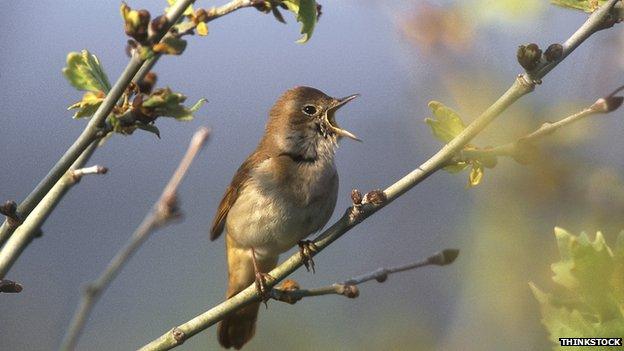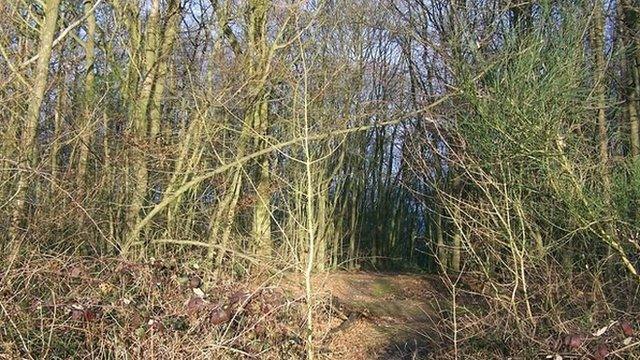Hoo peninsula development 'will destroy key nightingale site'
- Published
- comments

Numbers of UK nightingales decreased by almost 60% between 1995 and 2009
Plans to build up to 5,000 homes on a site that is said to be key to the UK's nightingale population have been condemned by environmental campaigners.
The Wildlife Trust said the move could cause "environmental destruction on a scale not seen for more than 20 years".
It comes after Medway Council approved the proposal, external for Kent's Chattenden Woods and Lodge Hill on Thursday.
Developers Land Securities say the area's 84 pairs of nightingales would be re-homed nearby.
The council estimates that the development, a former Ministry of Defence training camp, would bring almost 5,000 jobs to the area and says that affordable housing would account for one in four of the new homes.
Its plans also include three new primary schools, a secondary school and new health and leisure facilities.
But Stephen Trotter, director of the Wildlife Trust, England, called the decision to approve the development "astonishing".
"Medway Council and the Ministry of Defence have a national responsibility to look after Lodge Hill and Chattenden Woods for the benefit of our own and future generations."
John Bennett, of Kent Wildlife Trust also said the plans would "result in mass destruction of habitat and wildlife that cannot be replaced".
The area of land - on Kent's Hoo peninsula - was declared a "site of special scientific interest", external (SSSI) by Natural England last year, for its nightingale population and its ancient woodland.
Between 1995 and 2009, the UK's nightingale population decreased by almost 60%, according to the British Trust for Ornithology (BTO).
The BBC's environment analyst Roger Harrabin said it was for this reason that the proposals were previously rejected by a planning inspector.
'Much needed'
Writing on his blog, external, the RSPB's conservation director Martin Harper warned that the area was "possibly the most important site in the UK for this iconic and declining species".
"If the development goes ahead it would destroy the SSSI, including the home to more than 1% of our national nightingale population.
"Worse - it would set the terrible precedent for future development."
Calling on Eric Pickles the local government secretary to intervene, Mr Harper added: "This is not what we'd expect from 'the greenest government ever'."
But Robin Cooper, Medway Council's director for regeneration, community and culture, said: "This is one of the key regeneration projects in Medway that will shape the future of the area and provide much needed jobs for our young local people."
Developers Land Securities' plans include a replacement 304-hectare nesting habitat for the area's nightingales north of the Thames at Shoeburyness - a move described by the RSPB as "unscientific, unprecedented, and over-optimistic".
- Published5 September 2014

- Published29 May 2011